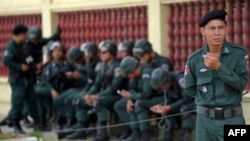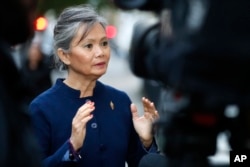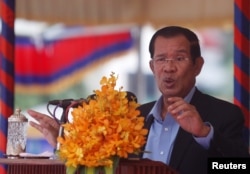Cambodian authorities have launched a crackdown on activists in a move observers say is an attempt to intimidate opposition supporters ahead of the planned, but uncertain return next month from self-exile of Sam Rainsy, the acting head of the now-dissolved opposition Cambodia National Rescue Party, and other opposition leaders.
Rainsy, who faces a range of charges and convictions in absentia and multiple arrest warrants, and others who fled the country following the 2017 dissolution of the CNRP, plan to return Nov. 9, which is Cambodian Independence Day and the anniversary of the day the Berlin Wall fell.
According to a CNRP list, as of midday Oct. 9, 37 activists affiliated with the party and former officials have been arrested this year and placed in pre-trial detention. Thirteen of those were arrested in September. Since then, four more members have been arrested.
More than a dozen others have been charged over the past week with incitement to commit a felony or with conspiracy to topple the government for attempts to mobilize citizens for the return of the opposition leaders.
Phay Siphan, a spokesman for Cambodia's Council of Ministers, said the arrests were justified as those arrested had indicated they would join Rainsy on his return to stage a coup.
“Sam Rainsy ordered the army to turn the guns against the elected government,” he told VOA. “They call everyone to stand up against the government.” Meanwhile, should the opposition return to Cambodia, Prime Minister Hun Sen threatened Oct. 7 to deploy armed forces to prevent an armed rebellion as the opposition party had called for armed forces to defect.
CNRP Vice President Mu Sochua rejected allegations that her group would take up arms.
The party "resolutely rejects the notion that the return from exile of the CNRP leaders can be treated as 'intention to commit armed rebellion' as such charges have no relation neither to reality nor to legality," she wrote on Twitter, adding, "We have No arms!”
In a message to VOA, she said that the CNRP called on soldiers to lay down their arms and “walk across to the civilian side.”
Deputy Asia director for Human Rights Watch Phil Robertson called the idea that the CNRP would return to Cambodia and mount a coup "frankly laughable."
"The Cambodian government, and particularly the prime minister, with his bodyguard unit, have such overwhelming force that any effort to protest on the streets against the government in a way that the government really is unhappy about could lead to an immediate violent crackdown," he said.
“He's manufacturing charges as fast as the Cambodian courts will pump them out to try to deter Rainsy and others from returning,” Robertson said.
Sochua told VOA she would return on Nov. 9 despite a March warrant issued against her and seven others based on charges of "plotting an incitement to commit felony." She said she expected arrests to follow “every day,” until Nov. 9, but that this would not serve the interests of Hun Sen's ruling Cambodian People's Party.
“The crackdown is [Hun Sen’s] miscalculation,” she said. “It makes people more angry.”
Sochua would not provide an estimate of the number of returning opposition members but said a list of returning opposition members would be posted October 26.
Political analyst Meas Nee said arresting CNRP supporters could be harmful to Cambodia’s government, calling the arrests “too extreme.”
“I think all these things, including the arrests, just ruin the reputation of the ruling party … Maybe until then [the return of Sam Rainsy], it could be possible that people’s anger will be built up inside the country,” he said, adding that this anger could lead to political unrest and violence if Rainsy were arrested.
Nee added that if Rainsy were imprisoned, "the next question would be whether this could be a final success of the government.”
Hun Sen last month requested assistance from other Southeast Asian nations in arresting Rainsy and his supporters if they entered those countries' territories.
Robertson said Thailand might extradite opposition leaders in exchange for Thai activists who had fled to Cambodia. In addition, he said, airlines might bar Rainsy from flights into Cambodia out of fear of government retribution.
“It's quite clear that Cambodia is also enlisting its neighbors to go after overseas dissidents, and try to make it more difficult for Rainsy and the CNRP to enter these countries,” he said.
Rainsy’s return, Robertson said, was therefore unlikely. “It’s hard to see how he could physically do it,” he said.










